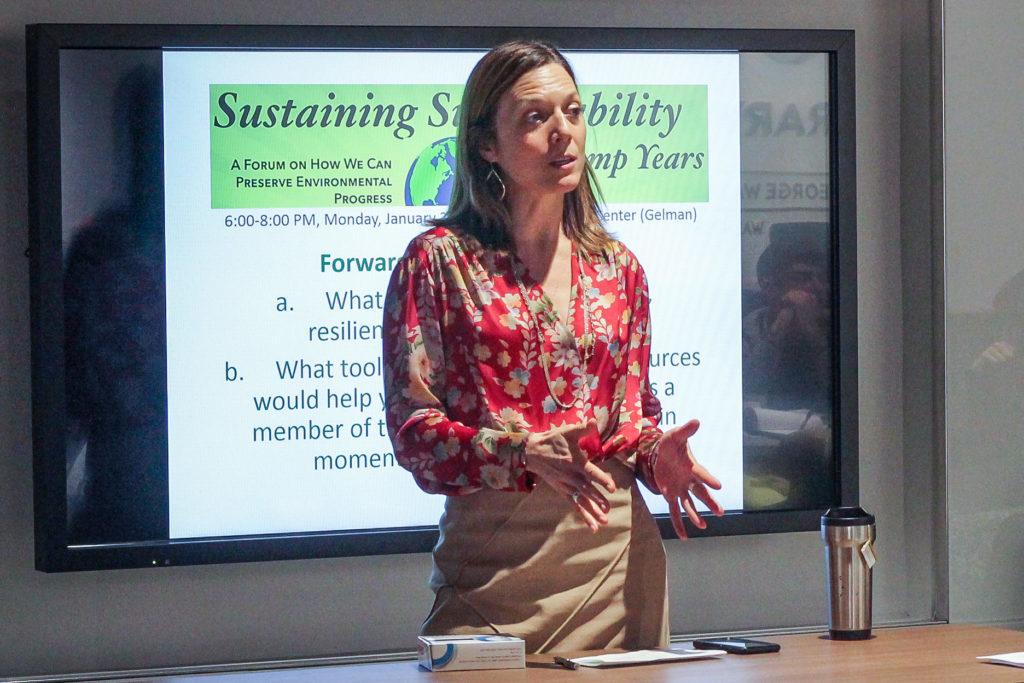GW’s new eco-friendly investment fund could set a standard for social responsibility, but experts say its overall financial impact will likely be negligible.
Officials revealed plans last week to invest $2 million of the University’s $1.7 billion endowment in a fund dedicated to sustainable companies. Experts said there is a common misperception that these types of funds are not economically viable, but they said even if the fund underperforms, it’s not large enough to affect the University’s overall financial wellbeing.
University spokeswoman Lindsay Hamilton said the Board of Trustees’ finance and audit committee will review the performance of the fund, as it does for all of the University’s investments.
She declined to say how the University expects the fund to perform or how officials ensured sustainable investments aligned with GW’s overall financial strategy.
The move follows a yearslong push from student activists for the University to divest from fossil fuel companies in its endowment. Administrators rejected the results of a student vote favoring divestment in 2016, saying that such a move wasn’t part of the University’s investment strategy.
Meghan Chapple, the director of the Office of Sustainability, said the University doesn’t believe that divestment is the sole or best way to mitigate the effects of climate change, pointing to efforts like the University’s goal to neutralize its greenhouse gas emissions by 2040.
Before committing to launch the new sustainable fund, officials said it would fall in line with the University’s overall investment strategy.
Investments in the fund, which is expected to be implemented by the end of the month, will be evaluated according to environmental, social and government standards – which look at a company’s energy use and waste to ensure it’s socially conscious. The fund will not invest in major oil, gas and coal companies, and all returns will be redirected to student financial aid, officials and student leaders said.
GW’s endowment grew by more than 10 percent last fiscal year, an increase officials attributed to a strong investment performance. Student Association President Peak Sen Chua said he hopes the fund will eventually expand to comprise 1 percent of GW’s total endowment – about $17.3 million.
Derek Hammel, the director of investment and treasury operations at Middlebury College, said the 1 percent goal may not be feasible at this early stage of the initiative.
“I think out of the gate that’s a big ask,” he said. “Once you start building experience, and hopefully if it does well and the markets continue to be strong and once you have a little bit of a track record, I think then you’ll be in a better position to ask for that large of an amount.”
If the fund proves to be successful, Hammel said it can help remove the “stigma” that eco-friendly investing is less profitable, which isn’t true in all cases.
“It will help if you can get the word out that this kind of investment makes money and to remove the stigma that green investing brings back lower returns and there’s tons of debate on this, back and forth, about can it work and does it work.” he said.
Georges Dyer, a principal of the Intentional Endowments Network, a nonprofit that helps companies and universities learn about sustainable investments, said universities are often wary of full divestment from fossil fuel companies, fearing it may pressure them to make similar moves in other industries perceived to have negative social impacts. But Dyer said divestment does not automatically lead to a loss of investment income.
More than 15 campuses have fully divested from fossil fuels, according to the University of Wisconsin’s environmental studies department.
“There’s been a lot of studies and research that shows that divesting from fossil fuels from any sector has typically very little impact on long term performance, but still that is the most common concern for investors not to divest,” he said.
Dyer’s group, which favors sustainable investing, studied funds that use socially conscious standards and found that these types of efforts help diversify investments and typically perform similarly compared to funds that don’t use environmental standard.
The University has not divulged its investments in fossil fuel companies or announced plans for full divestment.
Glenn Barnes, the associate director of University of North Carolina’s Environmental Finance Center, said the economic viability of the new fund depends on how officials define a sustainable company.
Narrowing the fund to only companies that deal directly with eco-friendly products might make it harder for it to achieve success, he said.
“You’ve got to have a definition of what that means in a company, so if that means that you’re going to support a company that manufactures solar panels, that may be an example, or it could be a company that’s not that at all but that has good corporate or sustainable practices, like Amazon,” Barnes said.





